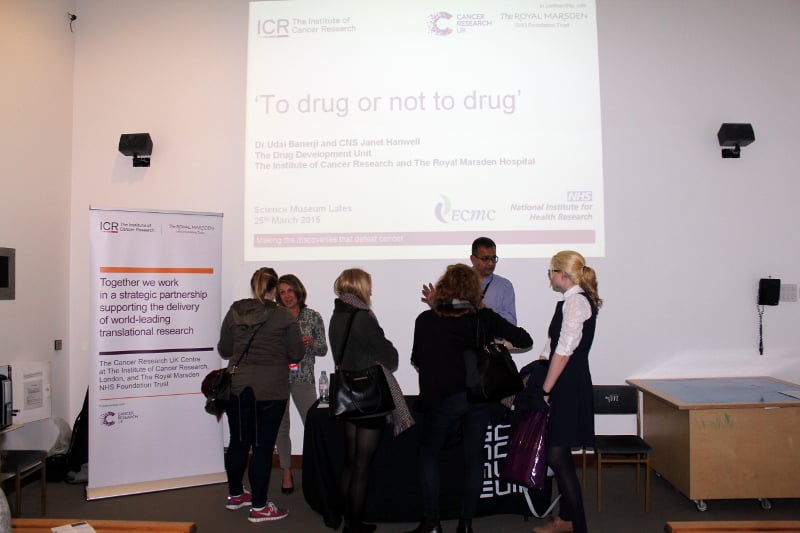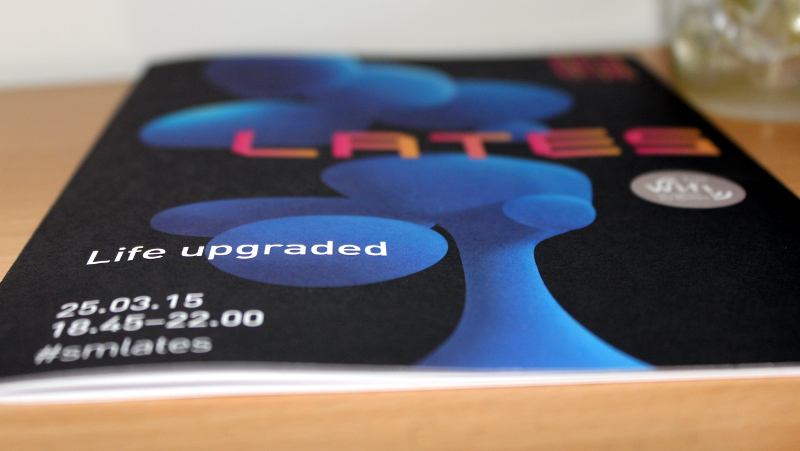 Dr Udai Banerji and Janet Hanwell talking to curious visitors at the Science Museum Lates
Dr Udai Banerji and Janet Hanwell talking to curious visitors at the Science Museum Lates
Late on the last Wednesday of March, The Institute of Cancer Research and The Royal Marsden visited the Science Museum for a special evening of scientific discussion.
A short stroll down the road from our Chelsea site, the Science Museum welcomes more than 3,000 people to its monthly Lates events. On the night, the usual child friendly museum activities are joined by the rather more adult silent disco, full bar service, and various discussions and debates.
The theme of the evening was Life: Upgraded. That means human enhancement, bioethics and new biological discoveries.
Dr Udai Banerji, Reader in Molecular Cancer Pharmacology at the ICR, and Janet Hanwell, a Clinical Nurse Specialist at The Royal Marsden, were there to talk about their experiences working to design and deliver clinical trials, and the ethics behind their work.
The event was titled To drug or not to drug,and the accompanying blurb asked: "When is it OK to test on people? If you had cancer, would you take part in a clinical trial of a new unknown drug? How do we ethically test new cancer drugs in people?"

The Science Museum was buzzing with activity, and as the time to our first talk grew nearer, a queue started to form outside the room. We probably had close to 60 people crammed into a room meant for 50, all of them keen to hear from the two presenters. And the room was just as full again, an hour later, for the second talk.
Dr Banerji, who works in the ICR’s and The Royal Marsden’s joint Drug Development Unit, was the first to speak. (The event was part of a programme of public engagement activities around the work of the Cancer Research UK Centre at the ICR and The Royal Marsden, which partially supports the unit.)
Dr Banerji talked about what happens in clinical trials, and how they have been changed by the move towards targeted cancer drugs. New cancer drugs home in on specific targets in a cancer cell and the drugs tend to be more selective. This means that the emphasis of phase I trials has changed – they not only study toxicity but address more complex aspects of drug development.
Janet Hanwell moved on to talk about the human side of the trials – who are the patients that take part, what are the risks and rewards, and what do patients consider when making the difficult decision over whether to take part in a trial.
Then it was time for questions from the floor. It was great to see visitors having the chance to share their thoughts and questions with two people who had such experience and understanding of the field.
Questions covered both the science – how do we know what doses to give to patients for the very first time and how do you choose which trials to put patients on – and the ethics, such as whether it would be safe to try new drugs earlier in the treatment pathway, and around the costs of developing new cancer drugs.
Our speakers were able to give thoughtful, sensitive answers to these questions. Dr Banerji rounded things off with a particularly inspiring response to the final question of the night, on what the future held for cancer research – describing the possible directions for new research, and how those young people in the room could well be involved in making it happen.
The whole evening was a fantastic experience, and a great way to make contact between scientists, clinicians, and the general public.
comments powered by